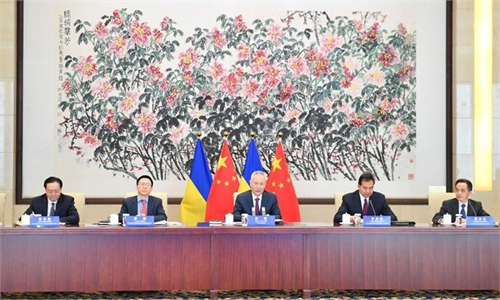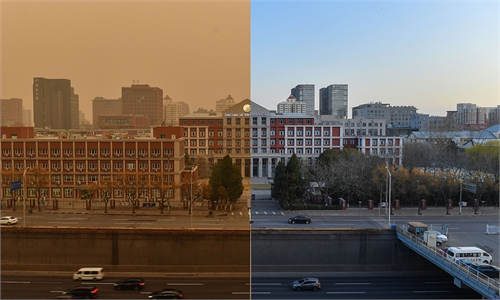
Illustration: Liu Rui/GT
One day after having announced that China will not become the world's most powerful country on his watch, US President Joe Biden suggested to British Prime Minister Boris Johnson in a phone call on Friday that democratic countries have an alternative to the China-proposed Belt and Road Initiative (BRI). Biden said a similar initiative should help "those communities around the world that, in fact, need help."However, is it easy for the US, which has repeatedly misinterpreted and stigmatized the BRI in the past years, to imitate China and develop its own version?
Despite the fact that Washington has aired its concerns over the BRI, it has yet to convince countries that it can offer a reliable alternative to the Chinese initiative. As the US is thinking about helping the world with infrastructure construction, its own infrastructure is in urgent need of update. As a matter of fact, Biden's $3 trillion package with a giant infrastructure plan to boost infrastructure in the US is still under debate - the plan cannot even make all Democrats say "Yes."
If the infrastructure scheme that Biden proposed really aims at improving connectivity between countries while promoting their infrastructure, it is worth anticipating. However, given the current moves and statements made by Washington, it is hard to say that the US has necessary capital or willingness to realize such an approach.
Moreover, as the "America First" doctrine still prevails in the US, any country will have to think twice whether there would be any additional precondition to accept the US "good will" and if they can afford it.
If Biden's initiative is another vision or advocacy to counter China, he can never meet other countries' real need in infrastructure by just paying lip service. The uncertainty of communities in need about Washington will deepen the US' crisis of credibility left by former administrations in the past years. But the promotion and development of such a cooperative initiative needs to be endorsed by the credibility of the US government.
In November 2019, the US announced the start of the Blue Dot Network (BDN), which was widely viewed as an alternative to counter the China-proposed BRI.
But the BDN, which focuses on the Indo-Pacific region while vowing to provide worldwide services, has hardly made any inspiring achievement. Its goal to promote financially sustainable development projects still sees dim hope for the future.
When Liu Xiaoming, the former Chinese ambassador to the UK, gave a live interview with BBC's Andrew Marr Show on October 18, 2015, Liu asked Marr, "Do you [Britain] have the money? Do you have the technology? Do you have the expertise?" in response to Marr's question that "China wouldn't allow a foreign power to build her nuclear power stations surely?"
Liu's three questions can still be applied to the current infrastructure scheme proposed by the US. While Washington cannot handle its domestic infrastructure construction well, it also engages in quarrels with its European allies over their infrastructure choices. As the US generally prioritizes its own interests in handling various affairs, it will only be a self-comforting fantasy for Washington to realize the infrastructure scheme.



